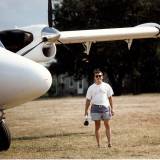
billokeefe
Members-
Content
6 -
Joined
-
Last visited
-
Feedback
0%
Community Reputation
0 NeutralGear
-
Main Canopy Size
150
-
Reserve Canopy Size
143
Jump Profile
-
Home DZ
Chambersburg, PA
-
License
D
-
License Number
7953
-
Licensing Organization
USPA
-
Number of Jumps
820
-
Years in Sport
28
-
First Choice Discipline
Formation Skydiving
-
First Choice Discipline Jump Total
780
-
Second Choice Discipline
CReW
-
Second Choice Discipline Jump Total
40
Ratings and Rigging
-
Rigging Back
Senior Rigger
-
Rigging Chest
Senior Rigger
-
Rigging Seat
Senior Rigger
-
BRAVO, you've hit the nail on the head. I could not agree more; "treat the pilots with respect and give them a sense of self worth". I would also add that this should go for ANY pilot that you've entrusted with your well being - 182 driver to the DC3 driver - low timer to high timer. Also your thought on the perks - ABSOLUTELY - if a DZ can't afford more money then providing lunch, etc. really goes a long way toward a positive attitude and that sense that the jumpers and/or DZO gives a damn.
-
Just a few thoughts on the issue of pilot pay. The following comes from my personal experience as a jump pilot both full and part time since 1982. 1. Unfortunately having a lot of hours flying jumpers does not always land you a better job even if it is in turbines. At most DZs there is no formalized training with the attendant documentation for that training that airlines want from a candidate that is applying for a positon. Airlines use a candidates previous training records to determine the potential of that candidate to be successful in that airlines training program. That is very important to any airline that is going to spend a lot of money training you before you even step in the airplane (in my case our Co. claimed $47,000. Not sure about that but I do know that the sims at USAIR are around $900 per hour). Last but not least is that a pilot flying skydivers gets not one hour of instrument experience and THAT is what any part 135 or 121 operator wants - experience in keeping the dirty side down in the nasty. 2. Unfortunately most DZs, because they can not afford to or they simply do not feel the need to spend the money, do not have any sort of initial or recurrent training program for their pilots that comes close to that which is needed for the caliber of aircraft that is now operated at a lot of DZs. Because of this fact it would sure make sense for a DZ to at least try and hire pilots with as much experience as possible. In closing, I don't advocate paying a gold mind for pilot services but one would think that paying just a bit better for a pilot that has at least a modicum of experience would greatly enhance safety and also realize another return for the DZ, greater longevity of the equipment. I know that most of us as jumpers really don't think too consciously about our own safety in the aircraft but the real question should be - what quality of pilot do YOU want at the controls when that aircraft loses one right after rotation and your wife or child is on board?
-
Queen Air as jump plane
billokeefe replied to Basejumperjeff's topic in General Skydiving Discussions
Talk to Larry Pennington at Skydive Suffolk. He operated a Queen Air for a long time and never had a problem. Of course he maintained it very well and had only one pilot (or very few) who flew it and that pilot was a very good pilot who WAS NOT a hot dog. If you want your aircraft to remain in nice condition part of the answer is PAY THE PILOT A FAIR WAGE. If you do that you might actually get a pilot that has some experience, wouldn't kill your aircraft and most probably wouldn't kill you if something goes down. By the By, at Raeford they operated Twin-Bo's not Queen Airs. Speaking of which (Twin-Bo's), if you are not dead set on a Queen Air the Twin-Bo is a very good jump plane for a small DZ that doesn't HAVE to have a turbine. There are the T-Bo's with and without the supercharged engines. If you do not need a real fast climber you will be much better off without the Super Bo. It's the superchargers which have a lot of the maintenance issues (all Queen Airs have the supercharged engines). Again talk to Larry Pennington. I've only met him a few times but he came across a super guy who would be willing to talk to you about these issues - he's really got the experience on this issue. Good luck.

